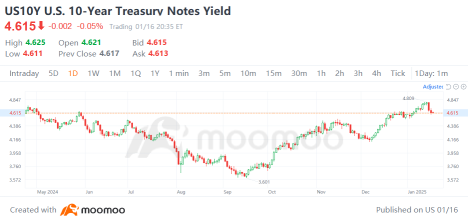No Data
IEF250411C103000
- 0.02
- -0.01-33.33%
- 5D
- Daily
News
The dilemma faced by Powell is the same as the market: "Schrödinger's Trump."
Should the economy be stimulated through interest rate cuts, or should high interest rates be maintained to curb potential inflation risks? Analysis suggests that under the uncertainty of tariff policies, the Federal Reserve cannot predict what Trump will do, much like the dilemma faced by the market: if he maintains tariffs as stated, the economy could rapidly shrink, and the S&P 500 Index may fall into a bear market; however, if tariffs are lifted, the economy may experience renewed growth, and the stock market could return to historic highs.
Whether Powell will take action to stabilize the market is a crucial indicator.
Goldman Sachs pointed out that if the credit spread further widens to 500 basis points, Powell is likely to intervene and change the policy stance as in 2018. Currently, the High Yield Bond spread has reached 454 basis points, just one step away from the dangerous threshold of 500 basis points.
New Tariffs Could Tip U.S. Economy Into Recession -- Market Talk
Two major market anomalies worth noting: "the dollar that followed the sharp decline of the U.S. stock market last week," and "the U.S. Treasuries that were aggressively sold on Monday without a rise in the U.S. stock market."
Unlike past situations where the USD typically strengthened during market turbulence, the USD has significantly weakened after the new tariff policy was implemented; on Monday, while U.S. stocks barely stopped their decline, U.S. Treasuries faced heavy selling.
The U.S. stock market has only stopped the sharp decline, but the U.S. bond market has collapsed, and hedge funds are "desperately fleeing."
The overnight dip in the USA $29 trillion treasury market reflects that hedge funds are desperately reducing leverage, and investors are flocking to Cash to avoid market volatility.
Will the Federal Reserve intervene to stabilize the market after the sharp decline? Analyst: Don't count on it in the short term.
Investors are expecting the Federal Reserve to intervene, but economists point out that inflation is the key issue at present. The Federal Reserve is unlikely to intervene in the short term and will need to wait for economic data to reflect the impact of tariffs before taking action, which may take months to manifest. For the market to trigger Federal Reserve intervention, a liquidity crisis must occur, such as exhaustion of liquidity in the U.S. Treasury market or other key parts of the financial system, but despite the recent crash in financial markets, there has not yet been a shortage of liquidity.
Comments
The S&P 500 and DJIA de...



The recent strength in Treasury yields is largely attributed to robust economi...

For more - see Markers suggest a pullback could come - and if history repeats itself markets could fall 27%. Citi says 10%


DaisyDowner : I'm on my way to break some short computers... kick out some MF JAMS